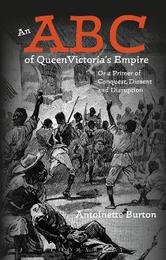
|
An ABC of Queen Victoria's Empire: Or a Primer of Conquest, Dissent and Disruption
Paperback / softback
Main Details
| Title |
An ABC of Queen Victoria's Empire: Or a Primer of Conquest, Dissent and Disruption
|
| Authors and Contributors |
By (author) Professor Antoinette Burton
|
| Physical Properties |
| Format:Paperback / softback | | Pages:184 | | Dimensions(mm): Height 216,Width 138 |
|
| Category/Genre | British and Irish History
Colonialism and imperialism |
|---|
| ISBN/Barcode |
9781474230162
|
| Classifications | Dewey:941.081 |
|---|
| Audience | | Tertiary Education (US: College) | |
|---|
| Illustrations |
30 bw illus
|
|
Publishing Details |
| Publisher |
Bloomsbury Publishing PLC
|
| Imprint |
Bloomsbury Academic
|
| Publication Date |
12 January 2017 |
| Publication Country |
United Kingdom
|
Description
An ABC of Queen Victoria's Empire offers a provocative rewriting of Mrs. Ernest Ames' ABCs for Baby Patriots (1899). Whimsically illustrated for the nursery or primary school child, Ames' book demonstrates how deeply imperialism reached into popular culture during Victoria's reign. This book presents a rather darker view of Victoria's empire, beginning with the wars in Afghanistan and ending with Zam-Zammeh, the large-bore cannon that Kipling's hero sat astride at the opening of his 1901 novel, Kim. It signposts some of the key events, concepts, places and people that shaped the turbulent ground of empire across the long 19th century, providing a serious counterweight to the notion of imperial conquest as child's play. With each letter accompanied by a crisp yet historically nuanced account of its subject, this unique account is the perfect primer for students taking courses on global, imperial and British history.
Author Biography
Antoinette Burton is Professor of History at the University of Illinois, USA. She has written widely on modern Britain and empire. Her most recent publications include A Primer for Teaching World History (2012) and Brown Over Black: Race and the Politics of Postcolonial Citation (2012).
ReviewsThe book is undoubtedly a triumph. Professor Burton's record as a prolific author on many aspects of the British Empire and on how best to teach it makes her an extremely appropriate person to have produced this book, and if it serves its purpose in attracting ever more people to the study of the British Empire, and in allowing for a more nuanced understanding of it, then she and her fellow contributors will have performed a valuable service. * Journal of Colonialism and Colonial History * A lively, original and thought-provoking book. Its alphabetic format is inspired - not only is the format easy to read, it also reminds us of the huge sprawl of empire while drawing out the common themes of violence and coercion that underlay colonial and imperial formations. An excellent textbook for courses on British imperial history. * Isabel Hofmeyr, University of the Witwatersrand, South Africa * This is a playful, but decidedly serious book. Whereas Victorian Alphabet books were invariably designed to help children learn their ABCs through patriotic, empire associations, this one is for adults seeking to reappraise the imperial past. It turns the older tradition on its head not only through honest and incisive appraisals of people and events in the British Empire, but also by dealing with topics barely possible in the originals - such as failures in colonial warfare, drugs, and sexual diseases. Students and others will find it a fascinating and valuable take on former empire propaganda. Antoinette Burton and her collaborators are to be congratulated on a clever idea, expertly executed. * Professor John M. MacKenzie, Emeritus Professor of Imperial History, Lancaster University, UK * Burton gives us a new imperial literacy, re-ordering through re-lettering our ideas of key people, places, events and materials of the British Empire. Convict women, dagga, famine, Gandhi and jihad get encyclopaedia-like entries with useful bibliographies. This book will generate many new research projects, and remake our sense of what is historically important, geographically central, and politically consequential. * Elaine Freedgood, New York University, USA *
|